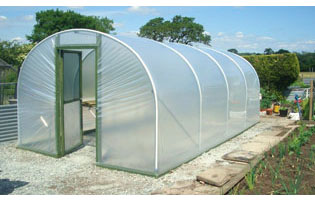Polytunnels are a great investment for anyone wanting to live more sustainably. Polytunnels help gardeners and fruit and veg growers to reduce their carbon footprints; they allow British commercial growers to increase their yields, limiting the amount of imported crops and cutting food miles. Hobby gardeners and anyone wanting to be more self-sufficient can grow their own home-grown produce inside a polytunnel, where a lot of organic growing can also take place.
 However, with many campaigners around the world fighting to end plastic pollution in the world’s rivers and oceans, the use of these structures covered with polythene, or “polytunnel plastic”, is sometimes questioned by people who are keen to be eco-friendly.
However, with many campaigners around the world fighting to end plastic pollution in the world’s rivers and oceans, the use of these structures covered with polythene, or “polytunnel plastic”, is sometimes questioned by people who are keen to be eco-friendly.
A polytunnel frame can last for 20 years and more, but the polytunnel plastic will need replacing over time. The polythene films we supply have been developed with resistance against polythene’s deadliest enemy – sunlight. The additives in our polytunnel covers prevent UV degradation for up to 5 years and it is not uncommon for a cover to last 8-10 years before it needs replacing.
When the time comes for your polytunnel plastic to be replaced, whether that be due to age, damage or UV degradation, the old plastic can be recycled.
There are a number of companies, found online, which recycle polythene or give advice on recycling plastic. In some areas, your old or damaged polytunnel cover can be recycled via the normal council recycling services.
The heavy duty polythene used to cover polytunnels can be repaired with repair tape, where necessary, and can be given a second life on your allotment or in your garden; it could be used to cover smaller structures, such as garden cloches or cold frames. Some customers use it to line ponds and raised beds or to act as a waterproof cover for garden furniture, others use it to cover ventilation netting or act as ‘double glazing’ on their polytunnels during the colder months. When the time comes for schools to recover their educational polytunnels, the old polythene is sometimes used for art projects.
With a little bit of imagination and creativity, you can recycle your polytunnel plastic in many ways, helping to reduce plastic waste and pollution and giving you the comfort of being environmentally friendly.
If you have any ‘green’ tips or creative ideas for recycling polytunnel covers, we would love to hear from you via e-mail or why not share your photos on our facebook or twitter pages.